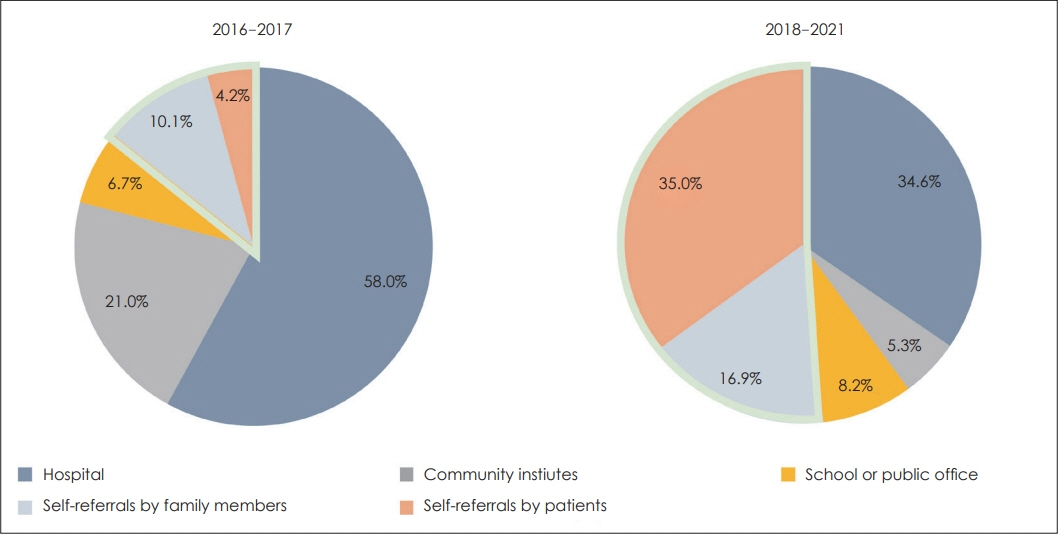Korean J Schizophr Res.
2022 Apr;25(1):1-9. 10.16946/kjsr.2022.25.1.1.
Early Intervention Model for Mental Health in Korean Youth: Mindlink
- Affiliations
-
- 1Department of Psychiatry, Chonnam National University Medical School, Gwangju, Korea
- 2Mindlink, Gwangju Bukgu Mental Health and Welfare Center, Gwangju, Korea
- 3Peace & Harmony Psychiatry Clinic, Gwangju, Korea
- KMID: 2529645
- DOI: http://doi.org/10.16946/kjsr.2022.25.1.1
Abstract
- Early detection and intervention are necessary to prevent deterioration and promote recovery in patients with schizophrenia. Mindlink is the first community-based early intervention center for young people with mental illness in Korea. This service was introduced in 2012 as a national mental health pilot project in Bukgu, Gwangju Metropolitan City. Due to the increase in the number of young clients, a youth-friendly, early intervention center called Mindlink was established in 2016. Mindlink is a comprehensive mental health service provided throughout multidisciplinary collaboration. It provides intensive case management and group programs, including cognitive behavioural therapy, family intervention, psychoeducation, motivational enhancement, and physical health promotion. The Korean government has stated that the Mindlink model is effective and is currently expanding the model to other areas in Korea. An increasing number of young people with distressing mental illnesses and their family members are approaching Mindlink for help. They are seeking early psychiatric intervention despite the stigma associated with mental illnesses. Our experience with the Mindlink model suggests that investing in improving the mental health in youth and in service delivery can overcome the stigma associated with mental illnesses and other barriers to mental health services. There is currently a lack of comprehensive mental health services for youth, which is a major problem. An accessible, youth-friendly, stigma-free, community mental health center, such as Mindlink, allows early detection and management of mental illnesses in young patients. Therefore, developing early intervention centers at the national level is urgently required.
Keyword
Figure
Reference
-
1. Statistics Korea. Causes of Death Statistics in 2020. 2021.2. Ryu S, Nam HJ, Jhon M, Lee JY, Kim JM, Kim SW. Trends in suicide deaths before and after the COVID-19 outbreak in Korea. PLOS One. (under review).3. Kim SW, Park IH, Kim M, Park AL, Jhon M, Kim JW, et al. Risk and protective factors of depression in the general population during the COVID-19 epidemic in Korea. BMC Psychiatry. 2021; 21:445.
Article4. Kessler RC, Berglund P, Demler O, Jin R, Merikangas KR, Walters EE. Lifetime prevalence and age-of-onset distributions of DSM-IV disorders in the National Comorbidity Survey Replication. Arch Gen Psychiatry. 2005; 62:593–602.
Article5. Patel V, Flisher AJ, Hetrick S, McGorry P. Mental health of young people: a global public-health challenge. Lancet. 2007; 369:1302–1313.
Article6. Gore FM, Bloem PJ, Patton GC, Ferguson J, Joseph V, Coffey C, et al. Global burden of disease in young people aged 10-24 years: a systematic analysis. Lancet. 2011; 377:2093–2102.
Article7. Insel TR. Assessing the economic costs of serious mental illness. Am J Psychiatry. 2008; 165:663–665.
Article8. Kim SW, Nelson B, Yang YK, Chung YC. Editorial: Early Intervention in Psychotic Disorders. Front Psychiatry. 2020; 11:574532.
Article9. Brewer WJ, Lambert TJ, Witt K, Dileo J, Duff C, Crlenjak C, et al. Intensive case management for high-risk patients with first-episode psychosis: service model and outcomes. Lancet Psychiatry. 2015; 2:29–37.
Article10. Kim SW. Psychosocial intervention for patients with schizophrenia. J Korean Neuropsychiatr Assoc. 2018; 57:235–243.
Article11. McGorry P, Trethowan J, Rickwood D. Creating headspace for integrated youth mental health care. World Psychiatry. 2019; 18:140–141.
Article12. Birchwood M, Connor C, Lester H, Patterson P, Freemantle N, Marshall M, et al. Reducing duration of untreated psychosis: care pathways to early intervention in psychosis services. Br J Psychiatry. 2013; 203:58–64.
Article13. National Institute for Clinical Excellence. Implementing the early intervention in psychosis access and waiting time standard: Guidance. London: NHS England Publications;2016.14. Kane JM, Robinson DG, Schooler NR, Mueser KT, Penn DL, Rosenheck RA, et al. Comprehensive versus usual Community Care for First-Episode Psychosis: 2-year outcomes from the NIMH RAISE early treatment program. Am J Psychiatry. 2016; 173:362–372.
Article15. Mueser KT, Penn DL, Addington J, Brunette MF, Gingerich S, Glynn SM, et al. The NAVIGATE program for first-episode psychosis: rationale, overview, and description of psychosocial components. Psychiatr Serv. 2015; 66:680–690.
Article16. Correll CU, Galling B, Pawar A, Krivko A, Bonetto C, Ruggeri M, et al. Comparison of early intervention services vs treatment as usual for early-phase psychosis: a systematic review, meta-analysis, and metaregression. JAMA Psychiatry. 2018; 75:555–565.
Article17. US Burden of Disease Collaborators, Mokdad AH, Ballestros K, Echko M, Glenn S, Olsen HE, et al. The State of US Health, 1990-2016: Burden of Diseases, Injuries, and Risk Factors Among US States. JAMA. 2018; 319:1444–1472.18. Yung AR, McGorry PD, McFariane CA, Jackson HJ, Patton GC, Rakkar A. Monitoring and care of young people at incipient risk of psychosis. Schizophr Bull. 1996; 22:283–303.
Article19. Amminger GP, Schäfer MR, Papageorgiou K, Klier CM, Cotton SM, Harrigan SM, et al. Long-chain omega-3 fatty acids for indicated prevention of psychotic disorders: a randomized, placebo-controlled trial. Arch Gen Psychiatry. 2010; 67:146–154.
Article20. Polari A, Lavoie S, Sarrasin P, Pellanda V, Cotton S, Conus P. Duration of untreated psychosis: a proposition regarding treatment definition. Early Interv Psychiatry. 2011; 5:301–308.
Article21. Murru A, Carpiniello B. Duration of untreated illness as a key to early intervention in schizophrenia: a review. Neurosci Lett. 2018; 669:59–67.
Article22. Kim SW, Jang JE, Lee JY, Lee GY, Yu HY, Park C, et al. Effects of group cognitive-behavioral therapy in young patients in the early stage of psychosis. Psychiatry Investig. 2017; 14:609–617.
Article23. Jo A, Kim H, Lee JY, Kim JM, Jeong MH, Chung YC, et al. The effects of patient personality traits and family cohesion on the treatment delay for patients with first-episode schizophrenia spectrum disorder. Early Interv Psychiatry. 2021; 15:889–895.
Article24. Birchwood M, Todd P, Jackson C. Early intervention in psychosis. The critical period hypothesis. Br J Psychiatry Suppl. 1998; 172:53–59.25. McGorry PD. The recognition and optimal management of early psychosis: an evidence-based reform. World Psychiatry. 2002; 1:76–83.26. Lee GY, Yu HY, Jhon M, Yoon JS, Kim SW. Intensive cognitive behavioral case management for functional recovery of young patients with schizophrenia. Korean J Schizophr Res. 2016; 19:32–37.
Article27. Kim SW, Kim JK, Jhon M, Lee HJ, Kim H, Kim JW, et al. Mindlink: a stigma-free youth-friendly community-based early intervention centre in Korea. Early Interv Psychiatry. 2021; 15:1389–1394.
Article28. Álvarez-Jiménez M, Gleeson JF, Henry LP, Harrigan SM, Harris MG, Killackey E, et al. Road to full recovery: longitudinal relationship between symptomatic remission and psychosocial recovery in first-episode psychosis over 7.5 years. Psychol Med. 2012; 42:595–606.
Article29. Marder SR. Integrating pharmacological and psychosocial treatments for schizophrenia. Acta Psychiatr Scand Suppl. 2000; 407:87–90.30. Kim SW, Chung YC, Kang YS, Kim JK, Jang JE, Jhon M, et al. Validation of the Korean version of the 16-Item Prodromal Questionnaire in a Non-Help-Seeking College Population. Psychiatry Investig. 2018; 15:111–117.
Article31. Kim SW, Lee GY, Yu HY, Jung EI, Lee JY, Kim SY, et al. Development and feasibility of smartphone application for cognitive-behavioural case management of individuals with early psychosis. Early Interv Psychiatry. 2018; 12:1087–1093.
Article32. Kim SW, Kim JK, Han JH, Jhon M, Kim JW, Lee JY, et al. Validation of the Korean Version of the 15-Item Community Assessment of Psychic Experiences in a College Population. Psychiatry Investig. 2020; 17:306–311.
Article33. Jhon M, Wang SY, Kim SY, Lee JY, Kim JM, Shin IS, et al. Roles of Psychiatrists in Mental Health Services: The Gwangju Mental Health Project “Mind Doctor”. J Korean Neuropsychiatr Assoc. 2021; 60:70–77.
Article34. Kim SW, Park WY, Jhon M, Kim M, Lee JY, Kim SY, et al. Physical health literacy and health-related behaviors in patients with psychosis. Clin Psychopharmacol Neurosci. 2019; 17:279–287.
Article35. Vázquez-Bourgon J, Ibáñez Alario M, Mayoral-van Son J, Gómez Revuelta M, Ayesa Arriola R, Juncal Ruiz M, et al. A 3-year prospective study on the metabolic effect of aripiprazole, quetiapine and ziprasidone: A pragmatic clinical trial in first episode psychosis patients. Eur Neuropsychopharmacol. 2020; 39:46–55.
Article36. Kinoshita Y, Furukawa TA, Kinoshita K, Honyashiki M, Omori IM, Marshall M, et al. Supported employment for adults with severe mental illness. Cochrane Database Syst Rev. 2013; 9:CD008297.
Article37. Ventriglio A, Gentile A, Bonfitto I, Stella E, Mari M, Steardo L, et al. Suicide in the Early Stage of Schizophrenia. Front Psychiatry. 2016; 7:116.
Article38. Walter F, Carr MJ, Mok PLH, Antonsen S, Pedersen CB, Appleby L, et al. Multiple adverse outcomes following first discharge from inpatient psychiatric care: a national cohort study. Lancet Psychiatry. 2019; 6:582–589.
Article39. Fusar-Poli P, McGorry PD, Kane JM. Improving outcomes of first-episode psychosis: an overview. World Psychiatry. 2017; 16:251–265.
Article
- Full Text Links
- Actions
-
Cited
- CITED
-
- Close
- Share
- Similar articles
-
- Psychosocial Intervention for Patients with Schizophrenia
- Mental Health Promotion and Illness Prevention: A Challenge for Psychiatrists
- The promotion of mental health and the prevention of mental health problems in child and adolescent
- History of the Korean Mental Health Act
- Predicting Factors on Youth Runaway Impulse




